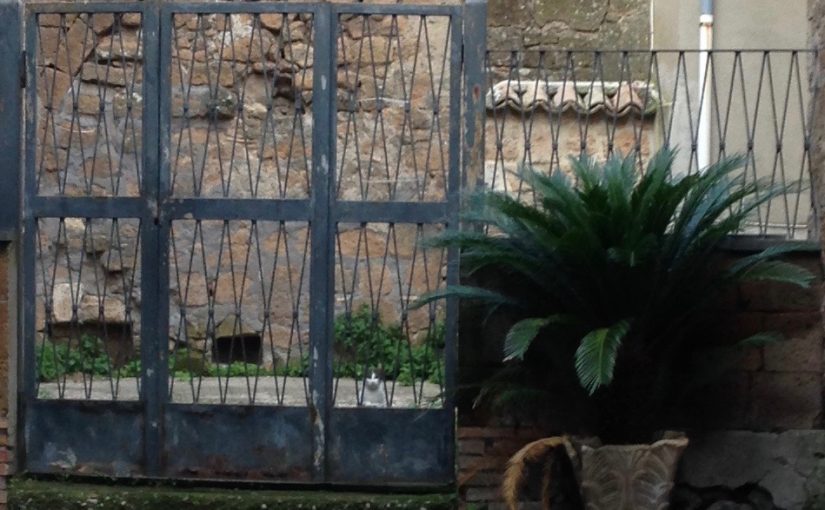I’ve been listening to a lot of public radio. I won’t listen to commercial radio because I cannot tolerate the vocal deliveries used for ads. I don’t listen to Italian radio – even though it would probably be a good idea – because… well, I want more content that I can understand on one pass. My threshold for virus-related news is growing thin, so I search for as yet unheard episodes of On Being, This American Life, Selected Shorts. As I walk in circles for at least two hours a day, I’m beginning to dip into archived episodes, when I can find them.
Once in awhile, I walk to music I happen to have on my phone, CD’s ripped to iTunes back when you could do that. Luigi Mancinelli, an Orvieto lad whose name the theatre bears, was a conductor of some fame in his day. He also composed a few things, and I have his Venetian Scenes, a suite that sounded thin and vague to me at first, but one I have come to love.
So anyway, radio. There are many splendid voices on radio, and a great variety. The perfect ironic whine of David Sederis, Marco Werman’s elegant rhythms, the humorous snark of Brooke Gladstone. There’s a traffic reporter for KQED in San Francisco, Joe McConnell, who has such gracefully balanced chest and head tones that I could listen all day to which interchanges are blocked because of a three-car collision. There is the slappy, snappy, midwestern ramble of Ira Glass. I love them all.
However. There is a style of speaking now fashionable on the airwaves that reminds me of a Pilates instructor. It’s pitched and modulated to rise above exercise music, and has a galloping rhythm to it, as if the speaker were tumbling down stairs. Sentences spurt, phrases end sporadically, and I, as a listener, feel as if words are being hurled at me like bean bags in a random game of catch. This has become a standard form of delivery on public radio, as if everyone is from Los Angeles. Possibly they are. I grew up in the Bay Area, so if you seem to detect a bias against Southern California culture, you’re right.
Before I spent weeks at a time in Italy, I assumed that vocal characteristics were like facial features, simply a part of who a person is. As a college-level acting teacher, I was hyper-aware of the tinny qualities American students brought to their voices, something that seemed to disappear after the age of thirty. I thought that was a physical progression, that they grew out of it, but because those tonalities are limiting for an actor (and don’t carry well on stage) I at least suggested to students techniques for relaxing and stabilizing the voice. It was usually an uphill battle.
Still, it seemed to me that Italian voices were different. I’d catch the differences, try to analyze them, but eventually decide they were products of my own romanticization of the culture. Then one evening after I moved here, I was out for a walk (not in circles – think of that!) and two men were a short distance behind me, talking. They had beautiful, resonant voices, full bass tones with lilting descants lending a delightful humanity to the flow. They were moving faster than I, so eventually overtook me – and were, at most, sixteen years old.
So voices are learned.
Listening to Selected Shorts today I kept remembering Isaiah Sheffer, who was until his death in 2012, the host and sometimes a special reader for that show. Hearing him speak was like listening to a Bach cello suite. The woman I just heard as host, today, is certainly intelligent, asked good questions in the author’s interview, and has a solid command of language, but was totally Pilates. And I hear those same vocal characteristics everywhere. I used to accept them as being “real”, refreshingly not-radio standard. Since those two young men passed me on that evening walk, I can’t do that anymore. Maybe a steady diet of perfect modulation is boring after awhile, but at least it sounds professional. Like a choice was made as to how to speak for a medium that is all about speech. The fellow being interviewed lifted the ends of sentences like a question? Many times in a row? And while their conversation was interesting and informative, when I found out they were both at least twenty years out of high school, I was a little surprised.
I am, I admit, being a snob.
I have heard that Italians are given significant training at school in rhetoric and public address. The results are mixed, to be sure. I’ll go to a concert with uncomfortable chairs, and squirm through a series of speeches that precede the music that seems to last longer than the performance. But I am amazed at how open, confident, and in command of the language most of the speakers are. And the voices are often magnificent.
Excuse me if I have obsessed, but hearing a voice in a natural setting, broadcast only by the speaker’s breath, would be transportive, right now. Even a Pilates instructor from San Fernando Valley would sound glorious – in person. Or maybe I’ll overcome my prejudices in a Mancinelli moment. It, like, totally could happen?
Yes, you’re right, the photo has nothing to do with the subject of this post. But can you find the cat?
